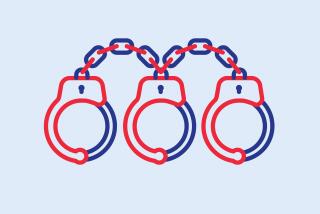3 Strikes: Cruel, Unusual and Unfair
The U.S. Supreme Court’s decisions upholding life imprisonment for shoplifters make reform of California’s three-strikes law through the Legislature or the initiative process imperative.
Today, 344 people are serving life sentences in California’s prisons for shoplifting a small amount of merchandise. More than 650 individuals are serving life sentences for possessing small quantities of drugs. Such sentences make no rational sense and are inhumane.
Unfortunately, the high court’s decisions mean that the only hope is for the Legislature to modify the three-strikes law to limit its application to those who commit serious or violent felonies. If the Legislature lacks the moral courage to make this simple change -- and so far its members have been unwilling to do so -- then there must be a voter initiative to revise the law.
The Supreme Court, by a 5-4 vote, upheld the indeterminate life sentence with no possibility of parole for 50 years that Leandro Andrade received for stealing $153 worth of children’s videotapes from Kmart.
An Army veteran and a father of three, Andrade never had committed a violent offense. He was 37 years old in 1996 when he was sentenced; his earliest possible parole date is 2046, when he will be 87 years old.
The other case the U.S. Supreme Court heard involved Gary Ewing, who received an indeterminate life sentence with no possibility of parole for 25 years for stealing three golf clubs.
For at least a century, the high court has held that grossly disproportionate sentences constitute cruel and unusual punishment in violation of the 8th Amendment. If any sentence is grossly disproportionate, surely it is life imprisonment for shoplifting.
As Justice David Souter observed in his dissenting opinion, “If Andrade’s sentence is not grossly disproportionate, the principle has no meaning.” In no other state could Andrade and Ewing have received these sentences. Every other state with a three-strikes law requires that the third strike be a serious or violent offense.
At the time Andrade and Ewing were convicted, the maximum penalty for rape was eight years in prison, for manslaughter, 11 years, and for second-degree murder, 15 years. Yet the U.S. Supreme Court says it is permissible to put shoplifters in prison for life.
Apart from it being cruel and unusual punishment, such a sentence for shoplifting makes no sense financially. It costs as much as $30,000 to imprison a person for a year. California is spending a large amount of money to incarcerate petty offenders -- funds that could be better spent educating children or sheltering the homeless.
And many studies by social scientists have shown that the three-strikes law has no appreciable effect in decreasing crime.
The goal, though, is not to eliminate the three-strikes law. No one denies that repeat violent offenders should be imprisoned for long periods. Rather, the law must be changed so that it is not used to put people in prison for life for such offenses as shoplifting or possessing a small amount of drugs for personal use.
Last year, Assemblywoman Jackie Goldberg introduced a bill to modify the three-strikes law so that it could be used only for serious or violent offenders. Astoundingly, the day the legislation was introduced, Gov. Gray Davis announced that he would veto it. The bill did not pass.
Opinion polls show that the majority of Californians favor changing the law to require that the third strike be a serious or violent felony. But elected officials don’t want to appear soft on crime, even when the crime is shoplifting. No politician wants to be vulnerable to a story of a shoplifter who was released and then committed a much worse crime.
Now that the U.S. Supreme Court has made clear that there will be no relief from inhumane sentences in the courts, legislators must show courage and change the law.
Otherwise, there must be an initiative in 2004 to revise the three-strikes law. Efforts are already underway to place an initiative on the ballot, but reform through the initiative process will be difficult.
Initiatives succeed best when they are well financed, and there is no wealthy constituency for reforming the three-strikes law.
I represented Leandro Andrade in the federal appeals court and the U.S. Supreme Court. Like so many people sentenced under the three-strikes law, he had committed a series of property crimes because of drug addiction.
Andrade already has served seven years in prison for stealing merchandise worth $153. He has 43 years left on his sentence and no hope from any court in the country.
In a nation that prides itself on basic human decency, and with a Constitution that prohibits cruel and unusual punishment, this just can’t be right.
More to Read
Sign up for Essential California
The most important California stories and recommendations in your inbox every morning.
You may occasionally receive promotional content from the Los Angeles Times.










